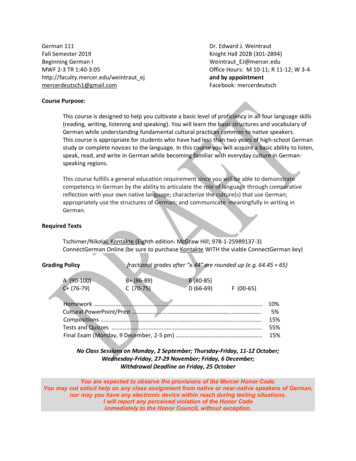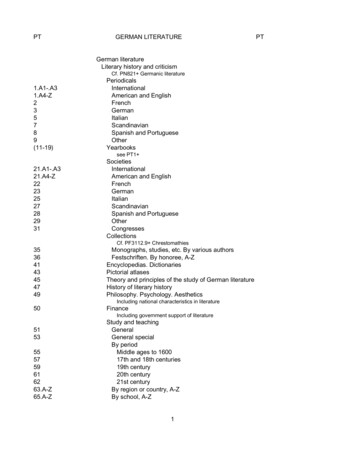
Transcription
German 111Fall Semester 2019Beginning German IMWF 2-3 TR 1:40-3:05http://faculty.mercer.edu/weintraut ejmercerdeutsch1@gmail.comDr. Edward J. WeintrautKnight Hall 202B (301-2894)Weintraut EJ@mercer.eduOffice Hours: M 10-11; R 11-12; W 3-4and by appointmentFacebook: mercerdeutschCourse Purpose:This course is designed to help you cultivate a basic level of proficiency in all four language skills(reading, writing, listening and speaking). You will learn the basic structures and vocabulary ofGerman while understanding fundamental cultural practices common to native speakers.This course is appropriate for students who have had less than two years of high-school Germanstudy or complete novices to the language. In this course you will acquire a basic ability to listen,speak, read, and write in German while becoming familiar with everyday culture in Germanspeaking regions.This course fulfills a general education requirement since you will be able to demonstratecompetency in German by the ability to articulate the role of language through comparativereflection with your own native language; characterize the culture(s) that use German;appropriately use the structures of German; and communicate meaningfully in writing inGerman.Required TextsTschirner/Nikolai, Kontakte (Eighth edition: McGraw Hill; 978-1-25989137-3)ConnectGerman Online (be sure to purchase Kontakte WITH the viable ConnectGerman key)Grading PolicyA (90-100)C (76-79)fractional grades after “x.44” are rounded up (e.g. 64.45 65)B (86-89)C (70-75)B (80-85)D (66-69)F (00-65)Homework . . 10%Cultural PowerPoint/Prezi . . .5%Compositions . 15%Tests and Quizzes . 55%Final Exam (Monday, 9 December, 2-5 pm) . . . . 15%No Class Sessions on Monday, 2 September; Thursday-Friday, 11-12 October;Wednesday-Friday, 27-29 November; Friday, 6 December;Withdrawal Deadline on Friday, 25 OctoberYou are expected to observe the provisions of the Mercer Honor Code.You may not solicit help on any class assignment from native or near-native speakers of German,nor may you have any electronic device within reach during testing situations.I will report any perceived violation of the Honor Codeimmediately to the Honor Council, without exception.
Disability Accommodations: Students in need of accommodation due to a disability should contact the Access andAccommodation Office to complete the verification process to become approved for services. In order to receiveaccommodations, each term, students will request accommodation and faculty notification forms through theAccess Office online system Accommodate. Students are strongly encouraged to schedule a meeting with eachprofessor in a timely manner to discuss arrangements. Accommodations are not retroactive in nature. Note Disability accommodations or status are not reflected on academic transcripts. Students with a history of adisability, perceived as having a disability or with a current disability who do not wish to use academicaccommodations are also strongly encouraged to complete the verification process with the Access Office. Studentsmust request accommodations in a timely manner to receive accommodations in a timely manner.The Access Coordinator for Macon Campus isKatie Johnson, Director and ADA/504 Coordinator.Phone: (478) 301-2778; email: johnson kc@mercer.eduWebsite: https://access.mercer.eduMental Health and Wellness: Mercer University faculty and staff recognize that mental health concernscan impact academic performance and interfere with daily life activities. Please notify your facultymember or academic advisor for academic assistance, as needed. The office of Counseling andPsychological Services (CAPS) can also provide support if you are feeling stressed, overwhelmed, anxious,depressed, lost, or are struggling with personal issues. Please call (478) 301-2862 or visit the CAPSwebsite for more information. These services are free and confidential, and support non-traditional,graduate, and undergraduate students. The CAPS office on the Macon campus is located in Linden House(attached to the MEP Residence Hall).Attendance Policy and Class ParticipationYou are expected to attend each class session and to contribute constructively to classroomactivities. Absences will affect your final grade adversely. Unless you provide me and/or theDean’s office with a valid written excuse for an absence, I will consider your absenceunexcused. For each class session missed after your fifth unexcused absence, two points willbe deducted from your final course grade.Despite the best of our intentions, laptops, tablets, cell phones, text messengers and pagerstend to become troublesome distractions. For this reason I want you to turn those devicesoff as soon as class starts. I will let you know when it is appropriate to access such devicesfor our class activities. First-time violators will receive a warning; for every subsequentinfraction three points will be deducted from the final course grade.HomeworkHomework will be assigned on a daily basis and must be submitted before the beginning ofthe next class meeting (ideally, an hour or so before class begins). Late submissions receiveNO credit. Assignments will be based primarily on web-based materials and hard-copyworksheets. Each component of a homework assignment is graded (3 excellent; 2 good;1 adequate; 0 unacceptable, late, or not submitted). The total number of points accrued bythe end of the semester constitutes ten percent of your final grade. Homework assignmentsand other ancillary materials will be updated regularly on the Canvas site for this course. Anyspecial group projects that are assigned will be graded under the rubric “Homework.” Given
the number and variety of homework assignments, there are no provisions for any extracredit work.Always check the Calendar in Canvas (left-hand sidebar) for a complete list of homeworkassignments for each day. Simply looking at what is assigned from Connect will not suffice!In an ongoing effort to improve the quality of instruction, each student enrolled in this courseis required to complete an end-of-semester course evaluation. Students failing to submit theevaluation by the deadline will be assigned the grade of “Incomplete.”Cultural PowerPoint/PreziBy the beginning of September you will identify three other students with whom you wouldlike to research a particular German festival or holiday. To be sfeiertag (1 August; Schweiz)Oktoberfest (21 September-6 October)Tag der Deutschen Einheit (3 October)Nationalfeiertag (26 October; Österreich)9. NovemberAdvent (1 December)St Niklaus Tag (6 December)Heiliger Abend/Weihnachten (24.-25. December)Silvester/Neujahrstag (31.December-1. January)Your group will then create a PowerPoint or Prezi on this topic and make a presentation inclass (in English!). I will evaluate your presentation according to the rubric provided on thissyllabus (85%); you will evaluate the quality of contributions made by each of your teammembers (15%).CompositionsObjectives and evaluation criteria for each written composition will be assigned at least oneweek prior to the deadline for submission. Late submissions will be penalized 10 points forevery calendar day past the deadline. If a rewrite is required or desired, you must hand in therevision by the second deadline. The revision will account for 35% of the composition grade(the original draft constituting the remaining 65%).Whatever you submit must be your work. Do NOT seek help from native speakers, near-nativespeakers, or advanced German students. Do NOT use any translation app, but you may consulta dictionary for individual words or phrases. The composition you submit should NOT differsignificantly from what you can write extemporaneously on a testing situation. If I suspect anyviolation of the cautions described above, I will report the case to the Honor Council.
Quizzes and TestsIn-class quizzes last approximately 5-10 minutes and will be announced at least one class dayin advance. Occasionally you may be required to complete a grammar, vocabulary, or listeningcomprehension quiz electronically via Canvas. The average of all your quiz grades will beconsidered to have the value of one major test. You may drop your lowest test grade (or twolowest quiz grades) at the end of the semester.Three major, hour-long tests are tentatively scheduled for Thursday, 12 September;Thursday, 17 October; and Monday, 18 November. If necessary, we can negotiateadjustments to this schedule in class. These tests are comprehensive, emphasizing thematerial presented in the most recent chapter, while including items from previous tests.Tests and quizzes may NOT be made up unless your absence had been excused by theUniversity or Dean’s Office.The final examination must be taken on Monday, 9 December, between 2 and 5 pm. The finalexam will be comprehensive. Emphasis will be placed on material covered in the final threeweeks of the semester.When taking a quiz or test you cannot have an electronic device anywhere near you. If youdo, I will consider this an attempt to cheat and forward my concern to the Honor Council.Access to Course GradesGrades will be posted and updated regularly on Canvas. I strongly encourage you to checkthese data on a regular basis; please report any discrepancies or inaccuracies to meimmediately. I also invite you to discuss your progress with me as often as you wish. I will notdiscuss your grades over the phone, via e-mail, or with anyone but you. If you receive a failinggrade on any test, you must consult with me immediately.
Assessment of Cultural PresentationsAccuracy and Appropriateness of Information (x5)Everything presented was factually trueand germane to the topic;9095100Most information was factually true, butthere were some errors or misunderstandings;758085Information presented was either riddled witherrors or digressed significantly from the topic606570Excellent; well-developed ideas; clear andsuperbly contextualize discussion of facts;speakers spoke loudly, clearly, and engaged the listeners9095100Interesting; fairly clear development of ideasand coherent discussion of facts; speakers spokeloudly or clearly, but rather monotone758085Boring; poor development of ideas; a vague andsuperficial recounting of facts; speakers mumbledor spoke almost inaudibly606570Excellent selection and sequencing of images;Images alone provide insights into theme;images arrest attention of viewer9095100Most images illuminate the theme; some imageshave little bearing on the topic or seem to bemere “fillers;” sequencing of images is “jumpy”758085Most images have little bearing on the topic;sequencing of images is poor or ragged; mostimages seem to have been selected merely to“fill space”606570Presentation of Information (x3)Creative Use of Images (x2)
Course Objectives:Functional Skills To Be MasteredGeneral ll be able to adapt and personalize memorized material to formquestions, statements, requests, and commands in everyday situationsin a way that a sympathetic native speaker would understandYou’ll be able to comprehend basic spoken discourse pertaining tofamiliar situations in a well-defined and limited contextYou’ll be able to comprehend narratives and dialogues on familiartopics, composed in simple, declarative sentencesYou’ll be able to record in narrative or dialogue sentences or paragraphswhich communicate some of your everyday, practical needs.Specific Abilities1) Exchanging PleasantriesGreeting Others, Leaning Names, Discussing Weather2) Sharing Personal InformationBirth Place, Current Residence, Likes and Dislikes, Appearance,Employment Situation, Academic Situation, Family Relations,Recreational Activities, Frequency or Duration of Activities3) Addressing Friends and StrangersMaking Requests; Asking Questions4) Using NumbersTelling Time, Exchanging Currencies, Counting Items,Determining Cost of items, Explaining Duration and Frequency5) Describing Everyday Scenes and Situations in Simple Narratives
What to expect from me this semester I teach at a fairly brisk pace. Virtually all of my interaction with the class will be in German, and I usea whole lot of visual aids to help you understand what I’m talking about. I try to call on each studenta few times every class session. There may be days when you get called on a lot, others on which youdon’t get a chance to say anything. Most of the time I use a four-second rule: if you are unable torespond to my question within four seconds, I’ll move on to another student. Don’t let this get youdown! I’ll ask the very same question to other students and then come back to you. By payingattention to what they say, you’ll learn from the other students how you should respond to thequestion, and this should gradually build up your confidence and competence in speaking German.My approach to teaching German does not line up perfectly with any textbook currently on themarket. Kontakte comes close, but I’m not entirely pleased with the sequence in which it presentscertain topics. For this reason I do not proceed page-by-page through the book; I jump around quitea bit. Some students find this bewildering, but you can always keep track of what I’ve covered bychecking the assignments on the Calendar in CANVAS. On CANVAS I also have an archive of everyvisual and handout that I use in class.I want you to have fun communicating meaningfully in German about simple, everyday activities.The fun part should come from the activities we do in class. To communicate meaningfully, you needvocabulary, but you also need structure. For this reason I emphasize the importance of grammar.You will learn what the basic rules for structuring simple German sentences are, but, moreimportantly, I want you to apply them fairly accurately. It is very possible that you make errors whileresponding to questions from me or other students. Have no fear! You’re not alone! Everyone makeserrors; even I do (I’m not a native speaker)! If you make an egregious error I will not call you out, aslong as you are communicating well. However, after we complete an activity I will usually drawattention to common errors that the entire class made and show how they can be avoided.What about tests? My tests generally have three components: German-English and English-Germanequivalents of individuals words and phrases; a variety of grammar-based exercises; and a creativepart in which you write out responses to personal questions and/or narrate a story based on a visual(e.g. cartoon). This latter part usually carries somewhat more weight than the other two. It’simportant to keep one thing in mind: I test only that which I teach in class or which you saw inhomework assignments. No test or quiz should ambush you. If you attend class and complete allhomework assignments, you should have a fairly good idea of what will I test and how I will test itbefore every seeing the actual exam.What can you do to be a successful student of German? Paying attention in class, asking questionsabout things you don’t quite understand, and completing all homework assignments are essential.But equally important is studying properly. Learning a language is a skill like riding a bike or playing amusical instrument. You cannot get good unless you practice regularly and attentively. Studies haveshown that you will retain a foreign language better if you study for 15- or 20-minute intervals threeor four times a day rather than one long marathon session. Two concepts are important here: dailypractice, and brief intervals. Sure, there may be times when you need to extend those intervals, orwhen you need to focus exclusively on one of your other classes. However, If you can disciplineyourself to be as consistent as possible in practicing German, I think you’ll make quicker and moresubstantial progress.
German 111 Dr. Edward J. Weintraut Fall Semester 2019 Knight Hall 202B (301-2894) Beginning German I Weintraut_EJ@mercer.edu










